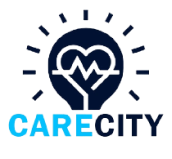
Nuclear medicine is a very important aspect of medicine, which focuses more on diagnostics study and can also be integrated into therapy, when used in the treatment of cancer (a therapeutic radiation dose is directed to the affected organ).
Nuclear medicine is a medical specialty that uses radioactive tracers (radiopharmaceuticals) to assess bodily functions and to diagnose and treat disease. (National Institute of Biomedical Imaging and Bioengineering)
“Nuclear medicine is an imaging modality that involves injection, inhalation or injection of radioactive tracers to visualize various organs. The tracer or radiopharmaceutical is produced through addition of a radioactive isotope to a pharmaceutical specific to the organ being imaged. The radioactive tracer emits gamma radiation, which is then imaged using a gamma camera.” (World Health Organization)
Common Clinical Applications
- Bone scan; to assess metabolic activity of the bones. Commonly used for oncology staging, arthritis, fractures.
- Myocardial Perfusion scan; to compare the blood flow to the myocardium at exercise and rest allowing for differentiation of ischaemia and infarction.
- Renal scan; to determine the perfusion and drainage of the kidneys and allow for calculation of differential function.
- Lung scan (VQ); to allow for comparison of ventilation and perfusion of the lungs to diagnose pulmonary embolism.
- Thyroid scan; to assess the appearance and function of the thyroid gland.
Nuclear medicine is a highly specialized branch of medicine. Radiological studies have helped to make management of various acute and chronic diseases.
Risks
- Because only a small dose of radiotracer is used, nuclear medicine exams have a relatively low radiation exposure. This is acceptable for diagnostic exams. Thus, the radiation risk is very low when compared with the potential benefits.
- Nuclear medicine diagnostic procedures have been used for more than five decades, and there are no known long-term adverse effects from such low-dose exposure.
- Treatment risks are always weighed against the potential benefits for nuclear medicine therapeutic procedures. Your doctor will inform you of all significant risks prior to the treatment and give you an opportunity to ask questions.
- Allergic reactions to radiotracers are extremely rare and usually mild. Always tell the nuclear medicine personnel of any allergies you may have or other problems that may have occurred during a previous nuclear medicine exam.
- Injection of the radiotracer may cause slight pain and redness. This should rapidly resolve.
- Women should always tell their doctor and radiology technologist if there is any possibility that they are pregnant or they are breastfeeding.
Prepared by
Ayinla Daniel (R.N)
(Chief Editor Care City Blog)
Important Links/further reading
- https://www.who.int/diagnostic_imaging/imaging_modalities/dim_nuclearmed/en/
- https://www.nibib.nih.gov/science-education/science-topics/nuclear-medicine
- https://www.google.com/amp/s/www.radiologyinfo.org/en/amp/gennuclear.html





Drop Your Comment